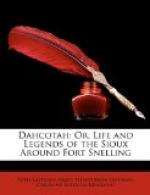Few have witnessed so wild a scene. The house of the interpreter employed by government is near the fort, and all around it were assembled the excited Indians. In front of the house is a piazza, and on it lay the body of a young Dahcotah; his black hair plaited, and falling over his swarthy face. The closed eye and compressed lips proclaimed the presence of death. Life had but recently yielded to the sway of the stern conqueror. A few hours ago Beloved Hail had eaten and drank on the very spot where his body now reposed.
Bending over his head is his wife; tears fall like rain from her eyes; and as grief has again overcome her efforts at composure, see how she plunges her knife into her arm: and as the warm blood flows from the wound calls upon the husband of her youth!
“My son! my son!” bursts from the lips of his aged mother, who weeps at his feet; while her bleeding limbs bear witness to the wounds which she had inflicted upon herself in the agony of her soul. Nor are these the only mourners. A crowd of friends are weeping round his body. But the mother has turned to the warriors as they press through the crowd; tears enough have been shed, it is time to think of revenge. “Look at your friend,” she says, “look how heavily lies the strong arm, and see, he is still, though his wife and aged mother call upon him. Who has done this? who has killed the brave warrior? bring me the murderer, that I may cut him on pieces.”
It needed not to call upon the warriors who stood around. They were excited enough. Bad Hail stood near, his eyes bloodshot with rage, his lip quivering, and every trembling limb telling of the tempest within. Shah-co-pee, the orator of the Dahcotahs, and “The Nest,” their most famous hunter; the tall form of the aged chief “Man in the cloud” leaned against the railing, his sober countenance strangely contrasting with the fiend-like look of his wife; Grey Iron and Little Hill, with brave after brave, all crying vengeance to the foe, death to the Chippeway!
CHAPTER II.
But yesterday the Dahcotahs and Chippeways, foes from time immemorial, feasted and danced together, for there was peace between them. They had promised to bury the hatchet; the Chippeways danced near the fort, and the Dahcotahs presented them with blankets and pipes, guns and powder, and all that the savage deems valuable. Afterwards, the Dahcotahs danced, and the generous Chippeways exceeded them in the number and value of their gifts. As evening approached, the bands mingled their amusements—together they contended in the foot-race, or, stretching themselves upon the grass, played at checkers.
The Chippeways had paid their annual visit of friendship at Fort Snelling, and, having spent their time happily, they were about to return to their homes. Their wise men said they rejoiced that nothing had occurred to disturb the harmony of the two tribes. But their vicinity to the Fort prevented any outbreak; had there been no such restraint upon their actions, each would have sought the life of his deadly foe.




